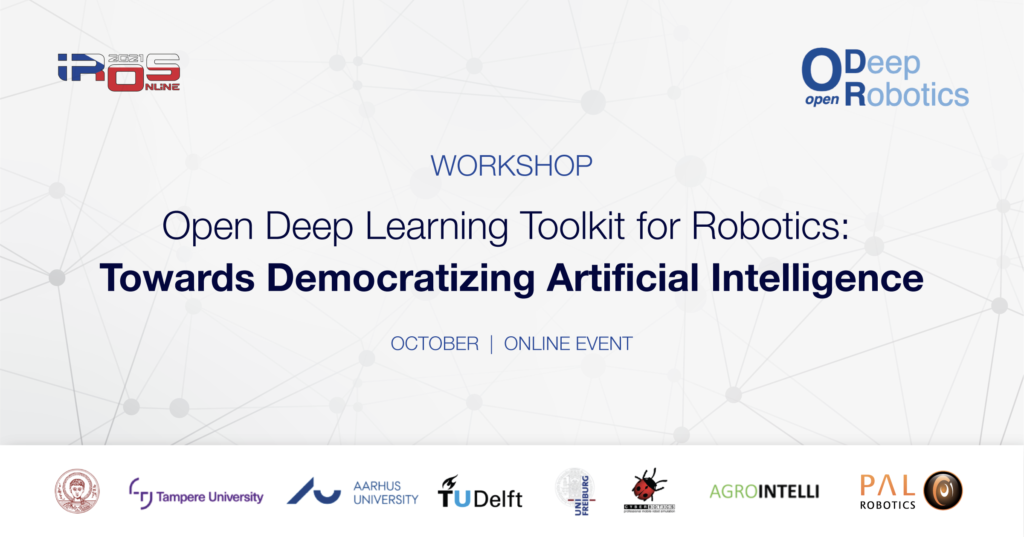We are happy to announce that we organize a workshop entitled “Open Deep Learning Toolkit for Robotics: Towards Democratizing Artificial Intelligence” under IROS 2021! The workshop will be held on October 1st 2021, 16:00-18:00 CEST fully virtually and will be supported by OpenDR.
Motivation
Recent advances in deep learning (DL) have led to a number of spectacular applications, ranging from self-driving cars, and (autonomous) robots that outperform humans in various tasks, to building algorithms that can understand and answer questions by fusing information from many modalities. By integrating the ability of DL and deep reinforcement learning (DRL) to learn complex behaviors, one can efficiently train robots that can interact with all the objects around them. However, the application of DL in robotics is not trivial and leads to specific learning, reasoning and embodiment problems and research questions that are typically not addressed by the computer vision and machine learning communities. Therefore, DL itself is an important area to be investigated, rather than only focusing its applications.
Motivated by the challenges and opportunities above, the first objective pursued through this workshop is to show and present how using artificial intelligence (AI) and DL in robotics can highly improve people’s lives. In addition, after the pandemic situation that has unfolded worldwide over the past few months, with uncertainties and the need to try to maximise all the resources in different sectors, specially in healthcare, it is crucial to raise awareness of the multiple and flexible solutions that robotics can provide. The second objective of the workshop is to show the importance of having an open DL toolkit for the robotics community, a fact which has been identified as an important goal of the European Union (EU) research in robotics. It is to be noted that while this workshop will focus on the design of an open toolkit for DL, the discussions will not be restricted to DL, but we will initiate fruitful discussions to have further open toolkits for various robotic methods.
Show More In summary, the need for open toolkits in robotics, such as a DL toolkit that contains easy to train and deploy, real-time, lightweight, ROS-compliant DL models for robotics, is a must. In this workshop, we will discuss various open toolkits for robotics, however we will focus on a DL toolkit designed within the OpenDR project. OpenDR’s main goal is to provide advanced perception, cognition and decision making abilities in robotics using DL and DRL with the help of an open toolkit. The project focuses, among other things, on incorporating human presence, activities, vocal instructions and emotional states recognition, to enable a person-centric human interaction in robotics. Show Less
Topics of interest
- Artificial Intelligence
- Deep Learning for Robotics
- Robot Learning
- Open-source toolkit
- Simulation
- Deep robot active perception and cognition
- Deep robot decision making
- Robotic applications
- Agriculture
- Healthcare
- Agile production
Invited Speakers
Silvia Rossi, PhD – Associate Professor Department of Electrical Engineering and Information Technology – D.I.E.T.I. – University of Naples Federico II
Abhinav Valada – Assistant Professor & Director of Robot Learning Lab at University of Freiburg
Alexandros Iosifidis – Associate Professor at Aarhus University
Roel Pieters – Associate Professor at Tampere University
Stefania Pedrazzi – Software Engineer at Cyberbotics Ltd.
Laura Ferranti – Assistant Professor at TU Delft
Francisco Martin Rico – Associate Professor at Rey Juan Carlos University
Ole Green – CEO at AgroIntelli
For more information please visit the workshop’s website here !
